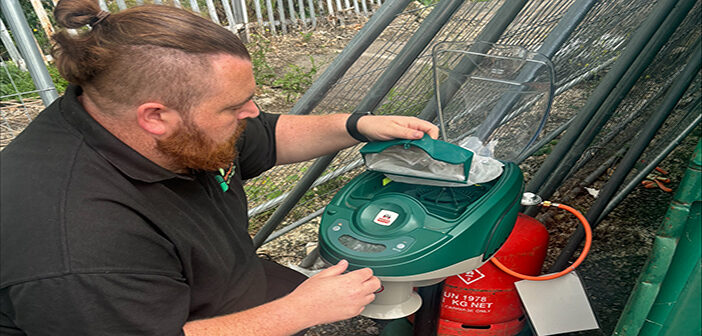London Network for Pest Solutions said it is continuing to play an important role in monitoring one of the planet’s deadliest insects by taking part in the Nationwide Mosquito Program.
The annual survey takes place over a three-month period on behalf of the UK Health Security Agency. LNPS technicians have installed a static trap called a mosquito magnet in Beckton, Newham, near to the sewage works.
The machine is attached to a propane gas cylinder which gives off a low level of carbon dioxide. Mosquitoes are attracted to the warmth and CO2 given off by humans and by mimicking humans, the mosquitoes are attracted into the unit from many miles away. They fly into an attached bag where they die because of lack of food – normally human blood.
The trap is checked every two weeks by the commercial team leader Mick Marbe, who checks and changes the bag and sends it to the Government’s Medical Entomology and Zoonoses Ecology (MEZE) team, which physically counts and identifies each species of mosquito caught. This is done around the UK and then, once a year, a report is produced.
Mr Marbe said: “We are looking to monitor mosquito species in the area close to Beckton sewage works. Last time we carried out monitoring we caught a non-native species. We were the only team in London to catch a non-native species and the only other team to catch one was in Norfolk.”
LNPS managing director Paul Cooper said: “I am so pleased that LNPS is continuing this work. It is far more important than people realise. It is an often forgotten fact that mosquitoes kill far more humans each year than any other creature. Figures vary but it is generally accepted by the WHO that mosquitoes are responsible for about three quarters of a million deaths worldwide each year.
“There are lots of mosquito solutions on the market, from personal wrist bands, small spray repellents, mosquito nets, noise emitters and the larger UVL machines but, as always, the best method of protecting yourself against mosquitoes is to ensure you remove any sources of standing water. That is where you can easily see their larvae. The standing water does not have to be big or deep, anything is suitable such as old tyres or unused plant pots.”




